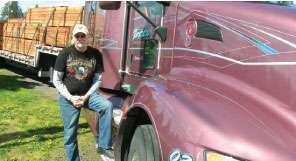
This letter came through email early this week from Robert W. Walker Jr. of Ohio, in response to a version of this piece, also published in the news section of the January 2014 issue of Overdrive. The story outlined commentary among a panel of fleet representatives about difficulties and successes bringing on new drivers as well as hanging onto the drivers they had.
I find it very humorous that every time I see discussion on this subject, the basic point is always missed! I hear about the need for health and wellness and nice trucks to drive, but rarely do I hear the words more money! The reason older drivers are leaving is simply too many regulations and not enough money! I have the same problem. I am an owner-operator. No one wants to come up with enough money so that we are able to make a decent profit. That is the bottom line — if you want to hire true professionals and keep them, pay more money! This is the most regulated and one of the top ten deadliest jobs in America. It always amazes me that a company can find money to do almost anything it needs to do except pay a decent wage to their drivers.
We’ve written about the issue time and again, from Jeff Clark’s set piece about the very term “driver shortage” (I always remember his analogy comparing the sentiment behind the term to a potential Cadillac buyer getting turned down by a dealer after an offer to purchase a new Escalade for 20 grand, then proclaiming a Cadillac shortage) to breathless reports on modestly improving pay conditions put forward in media as if a veritable “wage race” was under way.

I had a great conversation earlier this week with Washington State-based Tecco Trucking owner-operator Tilden Curl, whom you may remember for his testimony before a House committee on issues around the 2013 hours of service changes, or the listening sessions on electronic onboard recorders/hours and harrassment in 2012.
 Owner-operator Tilden Curl
Owner-operator Tilden CurlThis year Curl’s taken to blogging at the Tecco website, and I’d recommend the reading for its close focus on bedrock trucking issues. Curl’s eloquent in particular on the self-insurance “privilege,” he calls it, that exists for motor carriers today, which, he feels, is an indirect negative for safety on the whole. Removing the option to self-insure would require self-insured carriers to purchase insurance on the open market and “would do more for safety across the nation than any one thing we could do for the residual effects down the line,” he says. “First of all, it would reduce turnover” at carriers, as “companies would want to hang on to their safe drivers. And if they have to insure drivers coming out of school, once [the drivers] got into it, they’d have something worth hanging on to.”
With two million safe miles behind him, Curl says, today “there’s nothing out there that really values me over a new employee,” for instance. “If it’s line-haul stuff, drop and hook, they don’t want to pay for my level of experience, yet it’s my experience that saves people’s lives. What we would also do would be shoring up the future of trucking – guaranteeing that we’ll have a crop of drivers coming up … that will be insurable.
“How much longer are guys like me going to keep driving? There’s no retirement, very little medical, we need more money in the industry to pay for those things. The only way we’ll get that is if we have a value,” which he believes requiring all carriers to purchase insurance on the open market will deliver long-term.
He’s not the only one. As I wrote in late September about FMCSA’s move toward boosting minimum insurance requirements, OOIDA has long advocated for removal of the self-insurance option, commending the Obama administration for an inclusion of such a provision in its “Grow America Act” highway-bill draft earlier this year. More here. (Related: Curl’s currently among candidates for alternate board member spots at OOIDA.)
On the need for greater earning potential for drivers around the industry, Curl offers a personal example. “This is the best operation for me,” he says of his one-truck independent business. “I chose a long time ago not to grow my business. I didn’t feel like I could pay a driver what he needed to support his family, and it’s just not right to make a living off a family’s hardships.
“I don’t like the idea that we have to tell our kids that you can’t be a part of the band because we can’t afford the [instruments and] costumes, because your daddy’s a truck driver, or when that’s the reason for not being able to provide dental or health care. It’s just wrong, it’s wrong.”
This summer Curl issued a “five-plus challenge” to fellow truckers. As he wrote in introducing it, “The only thing that will turn the course to a better direction is if we speak louder than the people currently directing our path. It really doesn’t matter the issue that is most important to you, just speak up! My challenge to you is to have conversations with others about our issues. Find five people who will contact their representative on your behalf. This could be anyone that you know. Relatives, friends, neighbors, anyone that could use you as a window into a world that needs help. Encourage drivers that are sitting on the sidelines to get involved. If we all get five people involved, that could be millions of calls to our representatives.”











